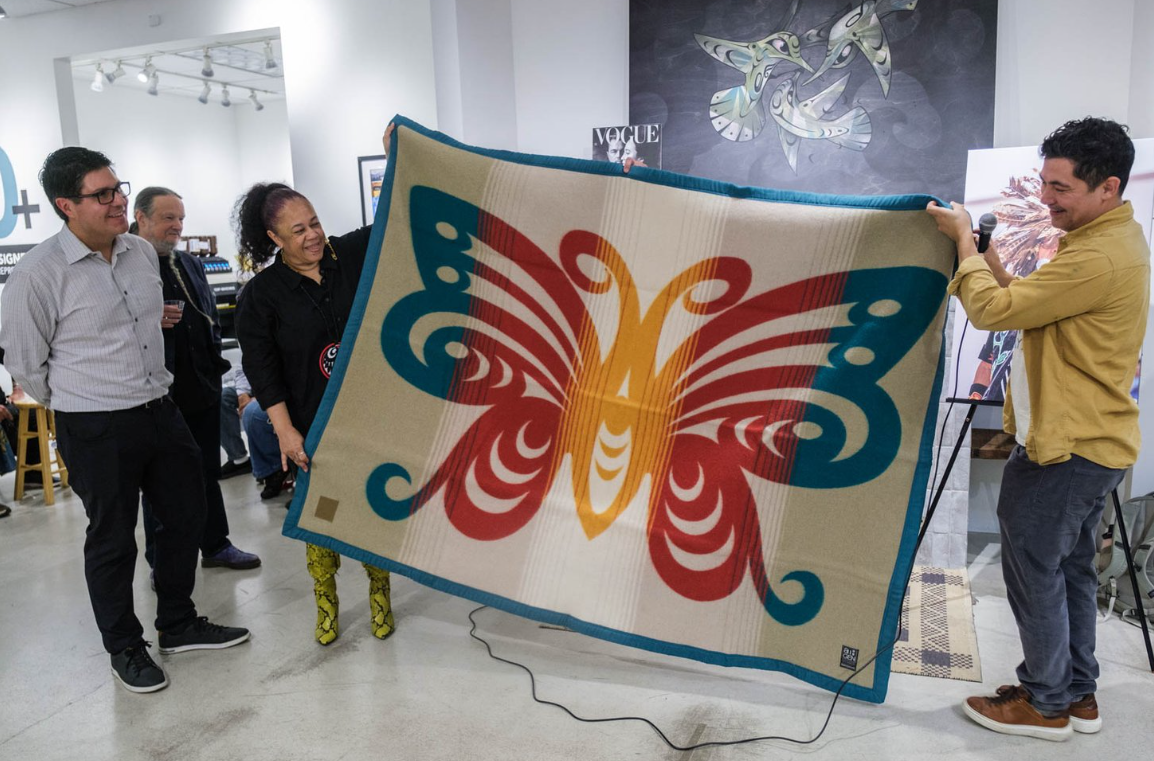
- Details
- By Omari Salisbury for Converge
SEATTLE - Nooksack visual artist, activist, and entrepreneur, Louie Gong, will announce a month-long partnership with Huy, an Indigenous non-profit organization providing economic, educational, rehabilitative and religious support for incarcerated Indigenous people. Gong’s first-of-a-kind design, the Never Say Goodbye wool blanket will be sold by Eighth Generation this fall.
A powerful and moving event recently unfolded in Seattle, celebrating the release of the Huy/Eighth Generation/Louie Gong butterfly blanket, a poignant symbol of transformation and hope for Indigenous people impacted by incarceration. Hosted by Eighth Generation and the Snoqualmie Tribe, the event wove together a tapestry of community leaders, formerly incarcerated individuals, and allies, all united by their commitment to healing, reintegration, and unwavering support for new beginnings.
Gabe Galanda, Huy’s Chairman and a citizen of the Round Valley Indian Tribes, eloquently articulated the urgent need to address the disproportionately high recidivism rates among Indigenous people. "The blanket really is intended for our relatives when they come home to have them wrapped in the warm embrace of a butterfly, which signifies to us transformation and metamorphosis," Galanda shared. The event, he explained, was designed to create a haven of acceptance and belonging where individuals could shed the weight of their past and step confidently into a future filled with promise.
[This article was first published by Converge. Used with permission. All rights reserved.]
Colleen Echohawk, CEO of Eighth Generation and a citizen of the Pawnee Nation of Oklahoma, spoke about the profound cultural significance of blankets in Native American communities. "In Indian country, we use blankets to really show how much we honor and respect someone," she explained. By wrapping individuals in the butterfly blanket, the community conveyed a powerful message of love, acceptance, and belief in their inherent worth. Echohawk emphasized the importance of extending this message of support to those currently incarcerated, assuring them that the Native community holds them in their hearts and eagerly anticipates their return.
Stacey Rice, the wife of Colville Tribal citizen Chief Rice, who has been incarcerated for nearly 40 years, offered a deeply personal and moving perspective on the importance of community support. "We want them to feel like they are successful. We want to help build them up to where they are successful because they give back to the community," she stated. Rice highlighted the ripple effects of incarceration, touching not only the incarcerated individual but also their families and communities. She called for understanding and empathy, emphasizing the importance of providing accessible resources and pathways for individuals to seek help, rebuild their lives, and contribute positively to their communities.
Jason Vickers, chef and owner of Natoncks Metsu and a formerly incarcerated individual himself, spoke candidly and powerfully about the challenges of reentering society after incarceration. "Not only the physical way of being, but the social way of being while incarcerated, is a very serious thing to learn when coming home," Vickers explained. He underscored the critical role of community involvement in easing the transition, offering practical support, and fostering a sense of connection. Vickers, who belongs to the Nipmuc Nation’s Hassanimsco Band, shared his own inspiring journey of finding purpose and belonging through community engagement, demonstrating the transformative power of second chances.
The event transcended its immediate purpose, becoming a powerful testament to the strength of community, the importance of compassion, and the unwavering belief in the human capacity for change. Through the symbolism of the butterfly blanket, Eighth Generation and Huy conveyed a message of hope and renewal, illuminating a path forward for Indigenous people on their journey to healing and reintegration. As the butterfly emerges from its cocoon, transformed and resplendent, so too can individuals emerge from their past experiences, stronger and more resilient, with the support of a loving and welcoming community.
Help us tell the stories that could save Native languages and food traditions
At a critical moment for Indian Country, Native News Online is embarking on our most ambitious reporting project yet: "Cultivating Culture," a three-year investigation into two forces shaping Native community survival—food sovereignty and language revitalization.
The devastating impact of COVID-19 accelerated the loss of Native elders and with them, irreplaceable cultural knowledge. Yet across tribal communities, innovative leaders are fighting back, reclaiming traditional food systems and breathing new life into Native languages. These aren't just cultural preservation efforts—they're powerful pathways to community health, healing, and resilience.
Our dedicated reporting team will spend three years documenting these stories through on-the-ground reporting in 18 tribal communities, producing over 200 in-depth stories, 18 podcast episodes, and multimedia content that amplifies Indigenous voices. We'll show policymakers, funders, and allies how cultural restoration directly impacts physical and mental wellness while celebrating successful models of sovereignty and self-determination.
This isn't corporate media parachuting into Indian Country for a quick story. This is sustained, relationship-based journalism by Native reporters who understand these communities. It's "Warrior Journalism"—fearless reporting that serves the 5.5 million readers who depend on us for news that mainstream media often ignores.
We need your help right now. While we've secured partial funding, we're still $450,000 short of our three-year budget. Our immediate goal is $25,000 this month to keep this critical work moving forward—funding reporter salaries, travel to remote communities, photography, and the deep reporting these stories deserve.
Every dollar directly supports Indigenous journalists telling Indigenous stories. Whether it's $5 or $50, your contribution ensures these vital narratives of resilience, innovation, and hope don't disappear into silence.
 The stakes couldn't be higher. Native languages are being lost at an alarming rate. Food insecurity plagues many tribal communities. But solutions are emerging, and these stories need to be told.
The stakes couldn't be higher. Native languages are being lost at an alarming rate. Food insecurity plagues many tribal communities. But solutions are emerging, and these stories need to be told.
Support independent Native journalism. Fund the stories that matter.
Levi Rickert (Potawatomi), Editor & Publisher
